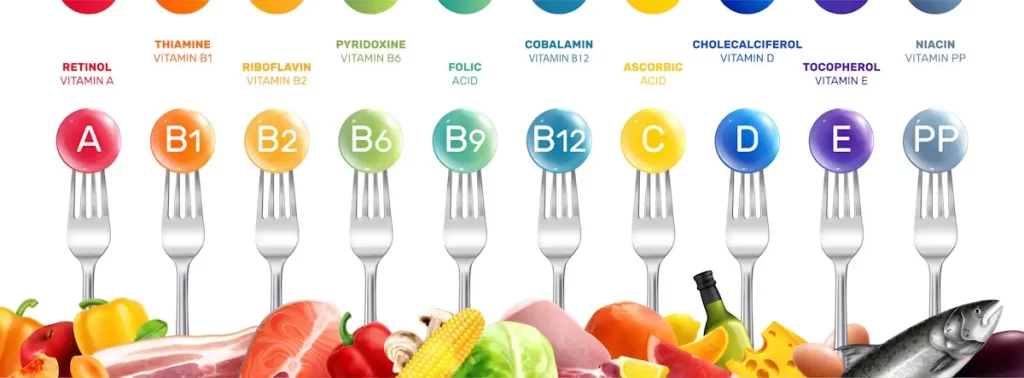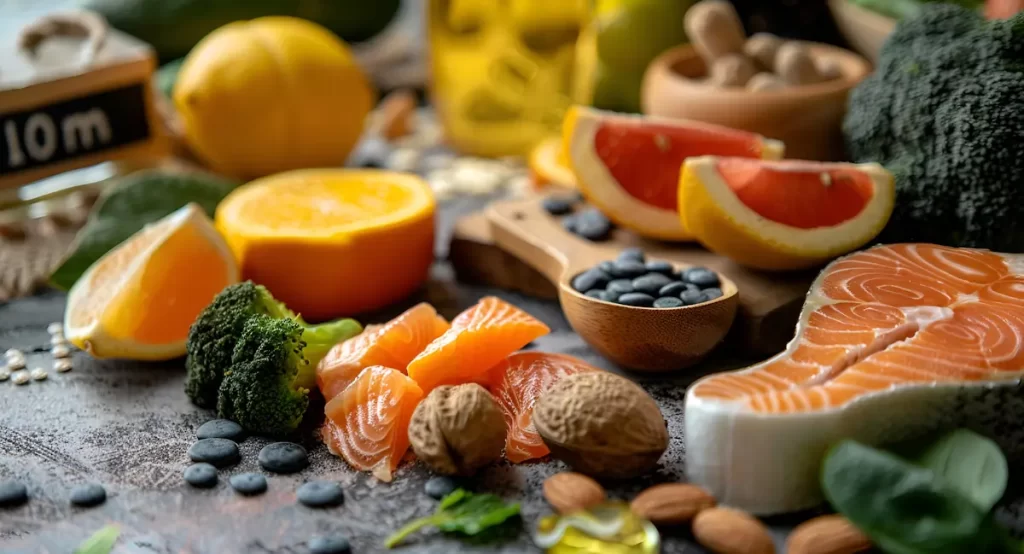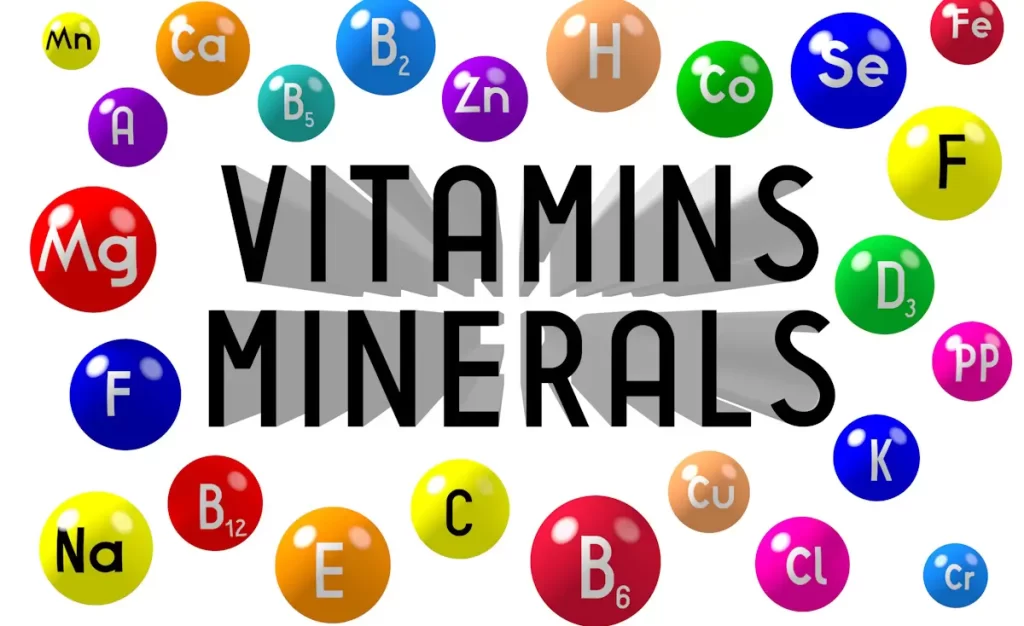Feeling tired, weak, or unfocused? Your body might be missing important nutrients called minerals. Minerals help with energy production, strong bones, and a healthy immune system. This article explains their health benefits and shows you the best foods to get them.
Thank you for reading this post, don't forget to subscribe!Keep reading—you’ll feel healthier in no time!
Key Takeaways
- Minerals are vital for health, supporting strong bones, oxygen transport, and immune function. Key examples include calcium, iron, magnesium, and zinc.
- Major minerals like calcium (1,200 mg/day) aid bone strength. Trace minerals like iron (1.8 mg/day) help carry oxygen in the blood through hemoglobin.
- Foods rich in minerals include dairy products for calcium; red meat and spinach for iron; nuts/seeds for magnesium; seafood and whole grains for zinc.
- Pair vitamin C with plant-based iron foods to improve absorption. Too much caffeine or sodium can block calcium absorption and weaken bones over time.
- Low mineral intake may lead to deficiencies like anemia (iron), osteoporosis (calcium), or cramps/fatigue (magnesium). A varied diet prevents these issues!
Categories of Essential Minerals
Minerals are divided into two main groups based on how much your body needs. Some are needed in large amounts, while others are required in smaller quantities but are still vital for health.
Major Minerals
Major minerals include calcium, magnesium, sodium, potassium, phosphorus, sulfur, and chloride. The body needs these in larger amounts compared to trace minerals. Calcium supports bone health and muscle function—adults need around 1,200 mg daily, while postmenopausal women may require up to 1,500 mg.
Magnesium helps over 300 enzymatic reactions in the body.
Sodium and potassium regulate hydration and nerve signals. For balanced blood pressure and electrolyte levels, these two must work together. Phosphorus strengthens bones with calcium’s support.
Foods like dairy products offer an excellent source of many major minerals… Keep reading for details on trace minerals!
Trace Minerals
Trace minerals include iron, zinc, copper, manganese, iodine, selenium, chromium, and cobalt. Though needed in small amounts, they play huge roles in health. Iron carries oxygen through the body via hemoglobin—70% of it resides in hemoglobin and myoglobin.
Zinc supports immune function and may bind with about 10% of proteins to assist various processes.
Selenium works as an antioxidant and protects cells from damage. Its daily recommended intake depends on age and gender. Iodine helps thyroid function by producing hormones that control energy production.
Copper aids blood vessel formation and maintains nerve tissues. Nuts, seeds, leafy greens, seafood like tuna or shrimp—all serve as great sources for these vital nutrients!

Key Health Benefits of Minerals
Minerals keep your body running smoothly and support many vital processes. They help build strong bones, carry oxygen in the blood, and maintain muscle function.
Bone Health: Calcium and Phosphorus
Calcium and phosphorus keep bones strong and healthy. Calcium supports bone structure, while phosphorus helps build tissues. Together, they work best at a 2:1 calcium-to-phosphorus ratio.
Young adults need 1,200 mg of calcium daily, but postmenopausal women require up to 1,500 mg to prevent osteoporosis.
High sodium can make the body lose calcium faster. Lower your salt intake for better bone health. Good sources of these minerals include dairy products like milk or cheese and leafy greens such as spinach or kale.
Strong bones rely on the right balance of nutrients.
Oxygen Transport: Iron
Iron helps make hemoglobin, a protein in red blood cells. Hemoglobin carries oxygen from the lungs to tissues all over your body. Without enough iron, this process slows down, and you may feel tired or weak.
Adults need at least 1.8 mg of iron daily to stay healthy. Iron deficiency can cause anemia, which leads to pale skin, fatigue, and shortness of breath. Good sources include red meat, spinach, nuts, and leafy greens like kale—pair these foods with vitamin C-rich options for better absorption!
Electrolyte Balance: Sodium and Potassium
Sodium and potassium help maintain fluid balance in the body. They also support nerve function and muscle activity. Sodium often comes from processed foods, with Americans consuming over 3,400 mg daily on average.
This is much higher than the recommended limit of 2,300 mg per day.
Potassium works to counter sodium’s effects by relaxing blood vessels and reducing pressure. Foods rich in potassium include bananas, oranges, spinach, and potatoes. Eating these can improve hydration, energy levels, and overall health while keeping electrolytes balanced.
Essential Minerals and Their Specific Functions
Minerals play key roles in keeping your body strong and working well. Each mineral has a specific job, helping with tasks like building bones, carrying oxygen, or boosting immunity.
Calcium: Bone Structure and Nerve Function
Over 99% of calcium is stored in bones and teeth. This mineral keeps them strong and supports bone health over time. It also helps prevent issues like fractures or conditions such as osteoporosis.
Calcium works beyond just bones—it’s vital for nerve function too. It aids in muscle movement and signaling between nerves. Without enough calcium, you might experience muscle pain or even cramps.
To maintain levels, eat dairy products or green leafy vegetables like spinach and kale regularly.
Iron: Hemoglobin Formation
Calcium strengthens bones, but iron powers blood health. Around 70% of the body’s iron is found in hemoglobin and myoglobin. Hemoglobin carries oxygen to cells, keeping energy levels steady.
Not getting enough iron leads to anemia. This can cause weakness or fatigue over time. Lean meats, poultry, spinach, and seafood are great sources of this essential nutrient. Adding them to your diet helps maintain healthy oxygen flow throughout your body.
Magnesium: Muscle and Nerve Function
Magnesium plays a key role in muscle function and nerve health. It supports over 300 enzyme reactions in the body, helping muscles contract and relax smoothly. Without enough magnesium, muscles might cramp or twitch.
Nerves also rely on this mineral to send signals correctly.
The adult body holds around 25 grams of magnesium. Men should aim for 420 mg daily, while women need 320 mg. Foods like nuts, seeds, and leafy greens are rich sources of this essential nutrient.
Adding these to your diet helps keep muscles healthy and nerves functioning properly.
Zinc: Immune System Support
Magnesium keeps muscles and nerves working. Zinc steps in to help the immune system. This mineral supports immune cell signaling, which helps your body defend itself against illness.
Nearly 2 billion people lack enough zinc, often leading to weaker immunity. Zinc-rich foods like meat, shellfish, dairy products, and whole grains can fill this gap. Adding these healthy foods to your diet strengthens your body’s defense system quickly and naturally!

Common Deficiencies and Their Symptoms
Mineral deficiencies can lead to serious health problems over time. Signs include fatigue, weak bones, or poor immunity—often linked to specific nutrient gaps.
Iron Deficiency: Anemia
Iron deficiency anemia impacts about 25% of people worldwide. It happens when the body doesn’t have enough iron to make hemoglobin, the protein in red blood cells that carries oxygen.
Without it, tissues and organs don’t get enough oxygen. This leads to fatigue, pale skin (pallor), and shortness of breath (dyspnea).
Women with heavy periods are at high risk due to blood loss. Vegetarians may also lack dietary iron from sources like red meat or poultry. Iron-rich foods such as spinach or fortified cereals can help prevent this condition.
Treatment often includes oral iron supplements or intravenous iron for severe cases.
Calcium Deficiency: Osteoporosis
Calcium deficiency weakens bones over time. This can lead to osteoporosis, a condition where bones become fragile and break easily. Postmenopausal women face higher risks due to lower estrogen levels affecting bone density.
People who are lactose intolerant may not get enough calcium if they avoid dairy products, a key source of this mineral.
Symptoms often include muscle spasms or twitching and neurological problems like confusion or memory loss in severe cases. Kids and teens need more calcium during growth years, while adults require it for maintenance.
Eating nutrient-dense foods like leafy greens or fortified cereals helps meet daily needs—preventing deficiencies that harm your health directly links to bone strength!
Magnesium Deficiency: Cramps and Fatigue
Low magnesium levels often lead to muscle cramps and fatigue. These symptoms can disrupt daily activities and reduce energy. Magnesium also plays a role in mental health and heartbeat regulation.
Without enough, you might feel anxious or notice an irregular pulse.
Daily intake recommendations are 420 mg for men and 320 mg for women. Yet, up to 15% of Americans may not meet this goal. Nuts, seeds, leafy greens, and whole grains are excellent sources of magnesium.
Adding these foods to your meals helps keep muscles strong and energy high.
Top Food Sources for Essential Minerals
Your meals can be rich in minerals if you choose the right foods. Some everyday options provide key nutrients to support a healthy body.
Dairy Products for Calcium
Milk, yogurt, and cheese are top sources of calcium. Dairy products provide about 72% of the daily calcium intake in the U.S. Adults need around 1,000 to 1,200 mg of calcium every day for strong bones and teeth health.
Calcium from dairy absorbs well—about 30%. One cup of milk offers nearly 300 mg of this essential mineral. Yogurt adds more variety with similar benefits, while cheese packs a flavorful calcium boost.
Keep reading to explore other key minerals like iron and magnesium!
Red Meat and Spinach for Iron
Red meat is a powerful source of heme iron. It helps the body make hemoglobin, which carries oxygen in the blood. Foods like beef and lamb are rich in this type of iron. Heme iron absorbs better than non-heme iron found in plant-based foods.
Spinach offers non-heme iron, making it a great option for vegetarians or vegans. Pairing spinach with vitamin C-rich foods boosts absorption. A simple squeeze of lemon on your salad can help! About 30% of women and children in the U.S. face iron deficiency—making these food choices even more vital for health.
Nuts and Seeds for Magnesium
Almonds, cashews, and Brazil nuts pack a magnesium punch. They support strong bones, energy production, and muscle function. Just one ounce of almonds provides about 20% of your daily magnesium needs—quick and easy!
Seeds like chia, flax, and pumpkin are also great choices. A tablespoon of chia seeds offers almost 10% of the needed magnesium for the day. These nutrient-dense foods also boost heart health while fitting into a balanced diet effortlessly.
Whole Grains and Seafood for Zinc
Whole grains contribute zinc, but phytates in them can limit absorption. Brown rice, whole wheat bread, and oats still offer small amounts of this important mineral. Pairing these foods with meat or vitamin C-rich vegetables may help your body absorb zinc better.
Seafood is a powerhouse for zinc. Oysters top the list with 33 mg per serving—making them one of the richest sources available. Fish like salmon and shellfish also provide good amounts.
A balanced diet with seafood and whole grains ensures you meet daily zinc needs for immune function and tissue repair.

How to Optimize Mineral Absorption
Absorbing minerals better can depend on what you eat and how you pair foods. Small changes in diet, like mixing certain nutrients, may boost your body’s ability to use them.
Combining Vitamin C with Iron-Rich Foods
Eating vitamin C-rich foods with iron helps the body absorb more non-heme iron. Non-heme iron comes from plant-based foods like spinach, beans, and whole grains. Pair these with citrus fruits, bell peppers, or even tomatoes to boost absorption.
Tea and coffee can block some iron absorption. Adding a source of ascorbic acid (vitamin C) cancels this effect. For example, squeeze lemon juice over leafy greens or eat an orange with your meal.
Combining heme iron from red meat or poultry with non-heme sources also improves overall intake efficiency. Keep meals nutrient-dense to support balanced diets and energy production!
Avoiding Calcium Blockers like Excessive Caffeine
Pairing vitamin C with iron-rich foods boosts absorption, but some habits can block calcium. High caffeine intake—over 400 mg daily, or about four cups of coffee—increases calcium loss through urine.
This weakens bones over time.
Sodium also adds to the problem by causing more calcium excretion. Balance is key for bone health and teeth strength. To absorb calcium better, include nutrient-dense foods like leafy greens and dairy products along with your daily dose of vitamin D.
The Role of Minerals in Chronic Disease Prevention
Minerals keep your body healthy and strong. They support heart health, manage blood sugar, and may lower disease risks.
Cardiovascular Health
Heart disease causes 30% of all deaths worldwide. Eating too much sodium, added sugars, and unhealthy fats increases the risk. High salt intake can raise blood pressure, while bad fats like trans fats clog arteries.
Added sugars may lead to obesity and diabetes, both linked to heart issues.
Eating fruits, vegetables, whole grains, and nuts can improve heart health. The Mediterranean diet focuses on olive oil, fish, whole grains, and fresh produce—helping reduce cardiovascular risks.
Similarly, the DASH diet lowers blood pressure by promoting foods rich in potassium but low in sodium. Simple changes in eating habits make a big difference for your heart.
Diabetes Management
Magnesium helps control insulin resistance, making it crucial for managing blood sugar. Low magnesium may worsen this condition. B vitamins play a role in breaking down homocysteine, which is linked to diabetes complications.
Chromium supports glucose metabolism by helping insulin work better. A chromium deficiency can impact how the body manages sugar levels. Eating leafy greens, nuts and seeds, whole grains, and nutrient-dense foods can boost these essential micronutrients.
Cancer Prevention
Certain minerals play a role in preventing cancer. Selenium may lower the risk of certain cancers by protecting cells from damage. Zinc boosts immune function and slows tumor growth, making it important for staying healthy.
Iron deficiency has been linked to a higher chance of developing some cancers. Cadmium exposure, often found in processed foods and tobacco smoke, is connected to several types of cancer.
Eating nutrient-dense foods like leafy greens and nuts can help reduce these risks while supporting overall health.
Conclusion
Minerals play a huge role in keeping us healthy. They support strong bones, steady heartbeat, and even energy production. Eating a mix of nutrient-rich foods like leafy greens, lean meats, dairy, nuts, and whole grains can help meet your needs.
Focus on variety to avoid common deficiencies and stay at your best. A balanced diet is the key to long-term health!
For a deeper understanding of how essential minerals work in tandem with other nutrients, explore our detailed guide on amino acids and their importance in your diet.
